The 7 Deadly Sins – We All Got Them, Control Them….Or Else
 My journey from entrepreneur to politics to education has helped me see the world from many different angles. The journey from success to failure has made me do some soul searching and the humbling experiences have caused me to pause and ask, what’s the meaning of life?. I’ve blogged and detailed where I think we are as a society. A deep dive into history and the rise and fall of civilizations start to paint a picture of where we are heading. (See Decline of America).
My journey from entrepreneur to politics to education has helped me see the world from many different angles. The journey from success to failure has made me do some soul searching and the humbling experiences have caused me to pause and ask, what’s the meaning of life?. I’ve blogged and detailed where I think we are as a society. A deep dive into history and the rise and fall of civilizations start to paint a picture of where we are heading. (See Decline of America).
I’ve compiled great ideas that speak to me on the economic, spiritual, historical, health and evolution of society that all helped me to understand what makes me tick and what makes my organizations, my local community, my country and the world work. (Deep Thoughts – The Whys of The Human Condition). You can spend hundreds of hours digging through all these categories and topics as I’ have and arrive at your own conclusions. I put forth my theory but highly encourage you to follow the Budda’s quote to “Believe nothing that you hear, half of what you see, and all of what you feel.” Basically, I humbly ask that you take all that I’m presenting to you with a grain of salt. Review everything from your own lense. 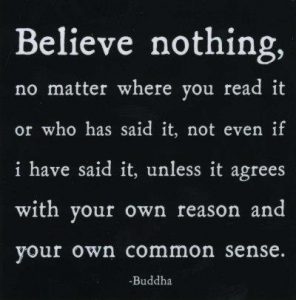
I am not a philosopher, although I study and learn from the greatest philosophers in history and I philosophize every day. I am not a historian, although I’ve dug in enough to history to learn from its patterns. I am not a theologian although I understand world religions and have arrived at what faith is to me. I am not a motivational coach, although I mentor and lead and work to improve those around me all the time. I am not the wisest, smartest or richest but I know my constant quest for learning from others, my ability to keep going when most give up and my abundant blessings make me appreciate each day and each gift I have been given, often times, more so than others with more graces than I’ve been given.
I’ve been blessed with good business skills that have been honed over 25 years of successes and failures. I’ve spent my 10,000 hours of deliberate practice on morning drive-time radio interviewing small business owners, authors, and political leaders, and have developed a skill that continues to serve me every day. I’ve been blessed with men that have appeared in my life at key times and mentored me in positive and supportive ways.
I put all this out to you, as the reader, to warn you that I am no expert. This book is deeply personal and what I’ve learned. My journey and yours are not the same. The goal of putting these ideas on paper is to lay out an argument. My hope is that you’ll see something in this work that turns on a light bulb for you. Perhaps something I describe will anger you and make you want to dig in for yourself to prove me wrong. Hopefully, something in here will strike a cord and help you to finally see an event in your life with greater clarity. In the end, this is about me, and I hope to share it with others that could possibly benefit.
I strive to live the life of my favorite Rudyard Kipling poem ‘IF’. Some days are better than others. I’ve learned what my shadows are and how they show up in my life every day. I strive to live Aristotle’s Golden Mean and control the ups and downs that have torn men apart for over 6,000 years. I have found my current thought leaders and philosophers and I have looked back into history to pull the parts and pieces of great minds that have influenced the world. I watch the news or events of the day with a critical eye. The ability to label a sports cheating scandal or a political infidelity scandal through the lens of the 7 Deadly Sins has been a powerful way that I attempt to make sense of the senseless. In my professional life, I chose to associate with people that are on the journey of self-discovery. I am prepared to be disappointed, as they will be disappointed in me. I leave space for forgiveness and grace and I’m willing and capable of parting ways with people that aren’t willing to self-reflect and evolve.
I put forth, that all these topics and all this research lead to a theory that explains why we do what we do that was put forth in the 3rd century by Christian Desert Fathers, and popularized by 14th-century artist rendition of Dante’s Inferno. Now you must understand history to realize how heavily this theory is rooted in Christianity. From the monks in the 4th century to Dante’s work in the 14th century, the Christian faith ran most of the free world. The Rennaissance and Martin Luther Treatise had not rocked the world and the role of faith, almost as the political controller of the masses. If you are not Christian, or you do not believe in Heaven, Hell or Purgatory, that’s fine. Take the ideas that are put forth in the 7 Deadly Sins and put them through your own lens. The ancient Greeks and Romans were putting forth similar ideas and they worshiped pagan gods. I see many of Dante’s ideas in the work of the Stoic’s which started with Zeon in 300 bc and were popularized in Marcus Aurelius’ medications in 200 AD. Don’t let your faith, whatever it may be, get in the way of the message of this book.
The root of it all;
- All the motivations that cause businesses to flourish or perish,
- The map that spells out why dictators rise and fall,
- The blueprint that spells out how to have a happy life
- A guide book that shows the path for a happy marriage and family
Can be learned if you follow the role of the 7 Deadly Sins and how they show up in your life.
The 7 Deadly Sins
The capital or cardinal sins are the big ones that are transgressions that knock our spiritual journey towards God off track. First written about by the Desert Fathers in the 3rd Century and formalized to 7 or 8 major sins by Evagrius the Solitary, a Christian monk and one of the most influential theologians of the 4th Century. The 7 Deadly Sins were made famous in the 14th Century in artworks by Dante’s Purgatory, which souls are grouped on Mount Purgatory by their cardinal sins.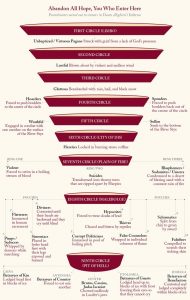
The 7 Deadly Sins were translated into the Latin of Western Christianity thus becoming part of the Western tradition’s Catholic devotions. In Latin, the categories were defined as;
- Gula (gluttony)
- Luxuria/Fornicatio (lust, fornication)
- Avaritia (avarice/greed)
- Superbia (pride, hubris)
- Tristitia (sorrow, despair, despondency)
- Ira (wrath)
- Vanagloria (vanity, glory)
- Acedia (sloth)
These “evil thoughts” can be categorized into three types:
- lustful appetite (gluttony, fornication, and avarice)
- irascibility (wrath)
- mind corruption (vainglory, sorrow, pride, and discouragement)
In AD 590 Pope Gregory I revised this list to form the more common list. Gregory combined tristitia with acedia, and vanagloria with superbia, and adding envy. Gregory’s list became the standard list of sins. Thomas Aquinas uses and defends Gregory’s list in his Summa Theologica. The Anglican Communion, Lutheran Church, and Methodist Church, among other Christian denominations, continue to retain this list. Moreover, modern day evangelists, such as Billy Graham have explicated the seven deadly sins. (Wikipedia)
The capital sins from lust to envy are generally associated with pride, which has been labeled as the father of all sins, etc.
Pride
 Pride (Latin, superbia) is considered, on almost every list, the original and most serious of the seven deadly sins: the perversion of the faculties that make humans more like God—dignity and holiness. It is also thought to be the source of the other capital sins. Also known as hubris, or futility, it is identified as dangerously corrupt selfishness, the putting of one’s own desires, urges, wants, and whims before the welfare of people.
Pride (Latin, superbia) is considered, on almost every list, the original and most serious of the seven deadly sins: the perversion of the faculties that make humans more like God—dignity and holiness. It is also thought to be the source of the other capital sins. Also known as hubris, or futility, it is identified as dangerously corrupt selfishness, the putting of one’s own desires, urges, wants, and whims before the welfare of people.
In even more destructive cases, it is irrationally believing that one is essentially and necessarily better, superior, or more important than others, failing to acknowledge the accomplishments of others, and excessive admiration of the personal image or self (especially forgetting one’s own lack of divinity, and refusing to acknowledge one’s own limits, faults, or wrongs as a human being).
As pride has been labeled the father of all sins, it has been deemed the devil’s most prominent trait. C.S. Lewis writes, in Mere Christianity, that pride is the “anti-God” state, the position in which the ego and the self-care directly opposed to God: “Unchastity, anger, greed, drunkenness, and all that, are mere fleabites in comparison: it was through Pride that the devil became the devil: Pride leads to every other vice: it is the complete anti-God state of mind.” Pride is understood to sever the spirit from God, as well as His life-and-grace-giving Presence.
In Ancient Athens, hubris was considered one of the greatest crimes and was used to refer to the insolent contempt that can cause one to use violence to shame the victim. This sense of hubris could also characterize rape. Aristotle defined hubris as shaming the victim, not because of anything that happened to the committer or might happen to the committer, but merely for the committer’s own gratification.The word’s connotation changed somewhat over time, with some additional emphasis towards a gross over-estimation of one’s abilities.
Dante’s definition of pride was “love of self-perverted to hatred and contempt for one’s neighbor”.
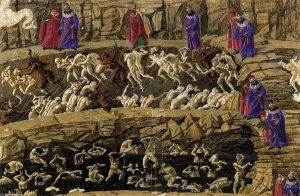
Benjamin Franklin said “In reality, there is, perhaps no one of our natural passions so hard to subdue as pride. Disguise it, struggle with it, stifle it, mortify it as much as one pleases, it is still alive and will every now and then peep out and show itself; you will see it, perhaps, often in this history. For even if I could conceive that I had completely overcome it, I should probably be proud of my humility.”
The proverb “pride goeth (goes) before destruction, a haughty spirit before a fall” (from the biblical Book of Proverbs, 16:18)(or pride goeth before the fall) is thought to sum up the modern use of pride. Pride is also referred to as “pride that blinds,” as it often causes a committer of pride to act in foolish ways that belie common sense.[45] In other words, the modern definition may be thought of as, “that pride that goes just before the fall.”
Lust
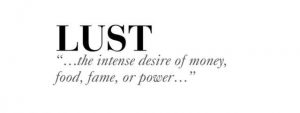 Lust, or lechery (Latin, “luxuria” (carnal)), is intense longing. It is usually thought of as intense or unbridled sexual desire,[22] which leads to fornication, adultery, rape, bestiality, and other immoral sexual acts. However, lust could also mean simply desire in general; thus, lust for money, power, and other things are sinful. In accordance with the words of Henry Edward Manning, the impurity of lust transforms one into “a slave of the devil”.
Lust, or lechery (Latin, “luxuria” (carnal)), is intense longing. It is usually thought of as intense or unbridled sexual desire,[22] which leads to fornication, adultery, rape, bestiality, and other immoral sexual acts. However, lust could also mean simply desire in general; thus, lust for money, power, and other things are sinful. In accordance with the words of Henry Edward Manning, the impurity of lust transforms one into “a slave of the devil”.
Lust, if not managed properly, can subvert propriety.
In Dante’s Purgatorio, the penitents walk deliberately through the purifying flames of the uppermost of the terraces of Mount Purgatory so as to purge themselves of lustful thoughts and feelings and finally win the right to reach the Earthly Paradise at the summit. In Dante’s Inferno, unforgiven souls guilty of the sin of lust are whirled around for all eternity in a perpetual tempest, symbolic of the passions by which, through lack of self-control, they were buffeted helplessly about in their earthly lives.
Gluttony
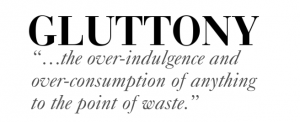 Gluttony (Latin, gula) is the overindulgence and overconsumption of anything to the point of waste.
Gluttony (Latin, gula) is the overindulgence and overconsumption of anything to the point of waste.
In Christianity, it is considered a sin if the excessive desire for food causes it to be withheld from the needy.
Because of these scripts, gluttony can be interpreted as selfishness; essentially placing concern with one’s own impulses or interests above the well-being or interests of others. During times of famine, war, and similar periods when food is scarce, it is possible for one to indirectly kill other people through starvation just by eating too much or even too soon.
Greed
 Greed (Latin, avaritia), also known as avarice, cupidity, or covetousness, is, like lust and gluttony, a sin of desire. However, greed (as seen by the Church) is applied to an artificial, rapacious desire and pursuit of material possessions. Thomas Aquinas wrote, “Greed is a sin against God, just as all mortal sins, in as much as man condemns things eternal for the sake of temporal things.” In Dante’s Purgatory, the penitents were bound and laid face down on the ground for having concentrated excessively on earthly thoughts. Hoarding of materials or objects, theft and robbery, especially by means of violence, trickery, or manipulation of authority are all actions that may be inspired by Greed. Such misdeeds can include simony, where one attempts to purchase or sell sacraments, including Holy Orders and, therefore, positions of authority in the Church hierarchy.
Greed (Latin, avaritia), also known as avarice, cupidity, or covetousness, is, like lust and gluttony, a sin of desire. However, greed (as seen by the Church) is applied to an artificial, rapacious desire and pursuit of material possessions. Thomas Aquinas wrote, “Greed is a sin against God, just as all mortal sins, in as much as man condemns things eternal for the sake of temporal things.” In Dante’s Purgatory, the penitents were bound and laid face down on the ground for having concentrated excessively on earthly thoughts. Hoarding of materials or objects, theft and robbery, especially by means of violence, trickery, or manipulation of authority are all actions that may be inspired by Greed. Such misdeeds can include simony, where one attempts to purchase or sell sacraments, including Holy Orders and, therefore, positions of authority in the Church hierarchy.
As defined outside Christian writings, greed is an inordinate desire to acquire or possess more than one needs, especially with respect to material wealth.[29] Like pride, it can lead to not just some, but all evil..
Sloth
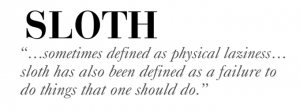 Sloth (Latin, tristitia or acedia (“without care”)) refers to a peculiar jumble of notions, dating from antiquity and including mental, spiritual, pathological, and physical states.[30] It may be defined as absence of interest or habitual disinclination to exertion.
Sloth (Latin, tristitia or acedia (“without care”)) refers to a peculiar jumble of notions, dating from antiquity and including mental, spiritual, pathological, and physical states.[30] It may be defined as absence of interest or habitual disinclination to exertion.
The scope of sloth is wide. Spiritually, acedia first referred to an affliction attending religious persons, especially monks, wherein they became indifferent to their duties and obligations to God. Mentally, acedia has a number of distinctive components of which the most important is affectlessness, a lack of any feeling about self or other, a mind-state that gives rise to boredom, rancor, apathy, and a passive inert or sluggish mentation, Physically, acedia is fundamentally associated with a cessation of motion and an indifference to work; it finds expression in laziness, idleness, and indolence.
Sloth has also been defined as a failure to do things that one should do. By this definition, evil exists when “good” people fail to act.
In his Purgatorio Dante portrayed the penance for acedia as running continuously at top speed.
Dante describes acedia as the failure to love God with all one’s heart, all one’s mind and all one’s soul; to him it was the middle sin, the only one characterized by an absence or insufficiency of love. Some scholars have said that the ultimate form of acedia was despair which leads to suicide.
Wrath
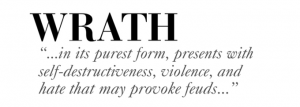 Wrath (Latin, ira) can be defined as uncontrolled feelings of anger, rage, and even hatred. Wrath often reveals itself in the wish to seek vengeance. In its purest form, wrath presents with injury, violence, and hate that may provoke feuds that can go on for centuries. Wrath may persist long after the person who did another a grievous wrong is dead. Feelings of wrath can manifest in different ways, including impatience, hateful misanthropy, revenge, and self-destructive behavior, such as drug abuse or suicide.
Wrath (Latin, ira) can be defined as uncontrolled feelings of anger, rage, and even hatred. Wrath often reveals itself in the wish to seek vengeance. In its purest form, wrath presents with injury, violence, and hate that may provoke feuds that can go on for centuries. Wrath may persist long after the person who did another a grievous wrong is dead. Feelings of wrath can manifest in different ways, including impatience, hateful misanthropy, revenge, and self-destructive behavior, such as drug abuse or suicide.
“People who fly into a rage always make a bad landing.”
— Will Rogers
Envy
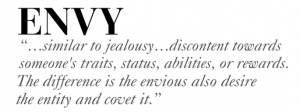 Envy (Latin, invidia), like greed and lust, is characterized by an insatiable desire. It can be described as a sad or resentful covetousness towards the traits or possessions of someone else. It arises from vainglory and severs a man from his neighbor.
Envy (Latin, invidia), like greed and lust, is characterized by an insatiable desire. It can be described as a sad or resentful covetousness towards the traits or possessions of someone else. It arises from vainglory and severs a man from his neighbor.
Malicious envy is similar to jealousy in that they both feel discontent towards someone’s traits, status, abilities, or rewards. A difference is that the envious also desire the entity and covet it. Envy can be directly related to the Ten Commandments, specifically, “Neither shall you covet… anything that belongs to your neighbor” – a statement that may also be related to greed. Dante defined envy as “a desire to deprive other men of theirs”. In Dante’s Purgatory, the punishment for the envious is to have their eyes sewn shut with wire because they gained sinful pleasure from seeing others brought low. According to St. Thomas Aquinas, the struggle aroused by envy has three stages: during the first stage, the envious person attempts to lower another’s reputation; in the middle stage, the envious person receives either “joy at another’s misfortune” (if he succeeds in defaming the other person) or “grief at another’s prosperity” (if he fails); the third stage is hatred because “sorrow causes hatred”.
Envy is said to be the motivation behind Cain murdering his brother, Abel, as Cain envied Abel because God favored Abel’s sacrifice over Cain’s.
In accordance with the most widely accepted views, only pride weighs down the soul more than envy among the capital sins. Just like pride, envy has been associated directly with the devil, for Wisdom 2:24 states:” the envy of the devil brought death to the world,”.
Biblical references of The seven deadly sins viewed by society and literature are:
- Lust – to have an intense desire or need: “But I tell you that anyone who looks at a woman lustfully has already committed adultery with her in his heart” (Matthew 5:28).
- Gluttony – excess in eating and drinking: “for drunkards and gluttons become poor, and drowsiness clothes them in rags” (Proverbs 23:21).
- Greed – excessive or reprehensible acquisitiveness: “Having lost all sensitivity, they have given themselves over to sensuality so as to indulge in every kind of impurity, with a continual lust for more” (Ephesians 4:19).
- Laziness – disinclined to activity or exertion: not energetic or vigorous: “The way of the sluggard is blocked with thorns, but the path of the upright is a highway” (Proverbs 15:19).
- Wrath – strong vengeful anger or indignation: “A gentle answer turns away wrath, but a harsh word stirs up anger” (Proverbs 15:1)
- Envy – painful or resentful awareness of an advantage enjoyed by another joined with a desire to possess the same advantage: “Therefore, rid yourselves of all malice and all deceit, hypocrisy, envy, and slander of every kind. Like newborn babies, crave pure spiritual milk, so that by it you may grow up in your salvation” (1 Peter 2:1-2).
- Pride – quality or state of being proud – inordinate self esteem: “Pride goes before destruction, a haughty spirit before a fall” (Proverbs 16:18).
The Cardinal Virtues
The Greek philosophers Aristotle and Plato, regarded temperance, wisdom, justice, and courage as the four most desirable character traits. The Book of Wisdom is one of the seven Sapiential Books included in the Septuagint. Wisdom 8:7 states that the fruits of Wisdom “…are virtues; For she teaches moderation and prudence, justice and fortitude, and nothing in life is more useful for men than these.”
The moral virtues are attitudes, dispositions, and good habits that govern one’s actions, passions, and conduct according to reason; and are acquired by human effort.[2]Immanuel Kant said, “Virtue is the moral strength of the will in obeying the dictates of duty”.[3] The cardinal virtues are prudence, justice, fortitude, and temperance.
- Prudence, from prudentia meaning “seeing ahead, sagacity”) is the ability to govern and discipline oneself by the use of reason.[4] It is called the Auriga virtutum (the charioteer of the virtues) as it guides the other virtues.[5]
- Justice is a virtue which regulates man in his dealings with others. Connected to justice are the virtues of religion, piety, and gratitude. [6]
- Thomas Aquinas ranks fortitude third after prudence and justice and equates it with brave endurance.[3] Patience and perseverance are virtues related to fortitude.
- Temperance is that moral virtue which moderates in accordance with reason the desires and pleasures of the sensuous appetite. Related to temperance are the virtues of continence, humility, and meekness.[6]
Philosophers recognized the interrelatedness of the virtues such that courage without prudence risks becoming mere foolhardiness. Aquinas found an interconnection of practical wisdom (prudentia) and moral virtue. This is frequently termed “the Unity of the Virtues.”[7] Aquinas also argued that it not only matters what a person does but how the person does it. The person must aim at a good end and also make a right choice about the means to that end. The moral virtues direct the person to aim at a good end, but to ensure that the person make the right choices about the means to a good end, one needs practical wisdom.[8].
Social Media and the 7 Deadly Sins – The Atlantic
Lust, of course, is Tinder. That’s easy. In Dante’s Inferno, a source of much seven-deadly-sin apocrypha, lustful souls are blown around forever like they’re stuck in a hurricane. Today they would be condemned to a similar cyclone—to swipe right forever but never get a match.
Gluttony is Instagram. We hear sometimes of Tantalus, stuck in a pool below branches laden with fruit. His punishment was that the fruit always pulled away from his grasp, and the water always receded when he tried to drink. So it is with Instagram: The most tantalizing morsels pass in front of our eyes, and we can eat none of them.
On to Greed. According to Dante, the greedy and avaricious are condemned to joust with each other using enormous heavy boulders, forever. What’s more, they are rendered unrecognizable—each soul appears as the blandest, dullest version of itself. Does that sound like LinkedIn or what? Mandelbaum’s translation put it particularly well:
… I saw multitudes
to every side of me; their howls were loud
while, wheeling weights, they used their chests to push.
They struck against each other; at that point,
each turned around and, wheeling back those weights,
cried out: “Hi, I’d like to add you to my professional network on LinkedIn.”
People To Discuss – 7 Deadly Sins
O.J. Simpson
Gov. Greitens – Missouri
Captain Chaos – Wrath
Trey Gowdy –
Gowdy has decided not to run again, and his reason appears legitimate, he does not like the atmosphere or what they are doing. In reference to the way business is conducted in Washington, he said “it is all about winning” and getting a bill through. He seems to understand this is not as important as doing the right thing. In the interview, his comments seemed to be tempered by his disillusion with a process where little ever really gets done in a definitive way.
Returning to why the 53-year-old lawmaker has decided not to seek reelection or seek higher office Gowdy says, “I will not be filing for reelection or seeking any other political elective office. Instead, I’ll be returning to the justice system. Whatever skills I may have are better utilized in a courtroom than in Congress. And I enjoy our justice system more than our political system.” A person familiar with his plans said that Mr. Gowdy had turned down an offer by the Trump administration him for a judgeship on the United States Court of Appeals for the Fourth Circuit and that he planned to enter private practice in South Carolina instead. Most likely Washington will be glad to see Gowdy depart because it is an area of the country where truth is not held in high regard simply gets lost in the noise.


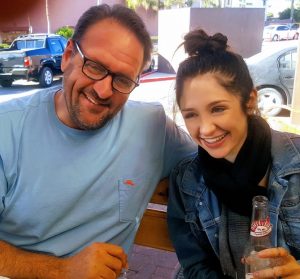
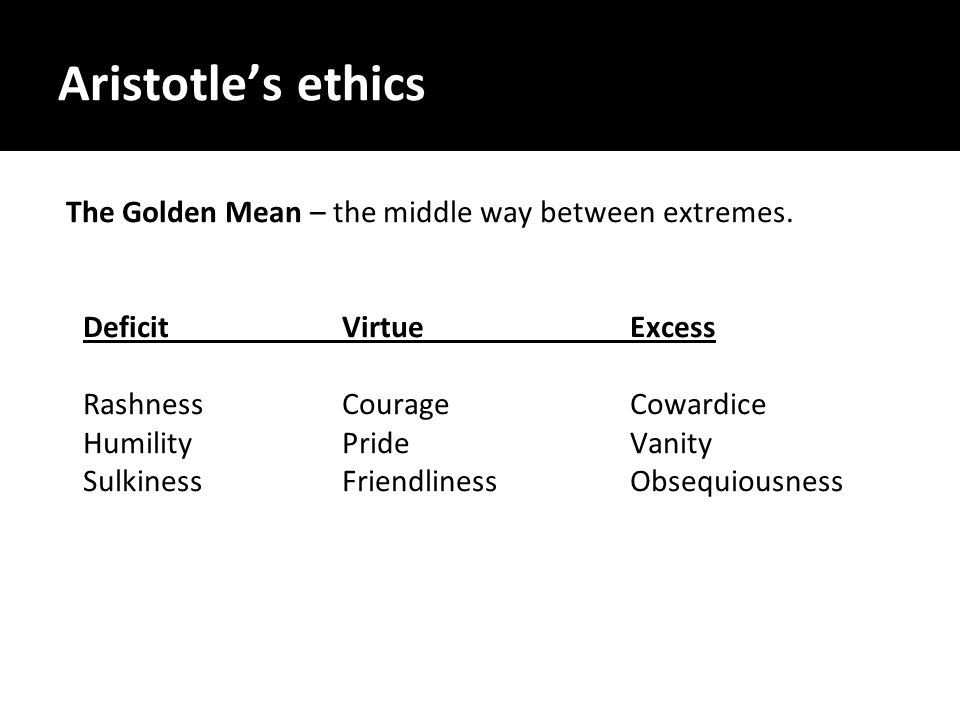
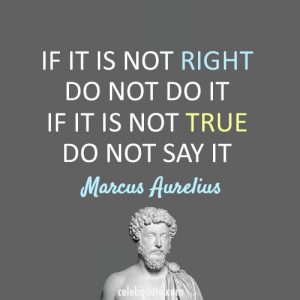
 The Stoics impacted history! In The Theory of Moral Sentiments,
The Stoics impacted history! In The Theory of Moral Sentiments,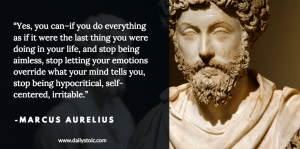 The First
The First 2. Every Man Should Take Lessons from Everyone Around Him
2. Every Man Should Take Lessons from Everyone Around Him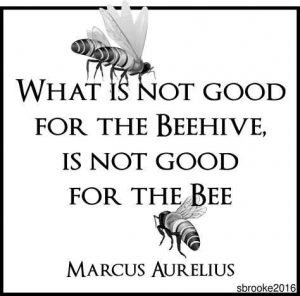
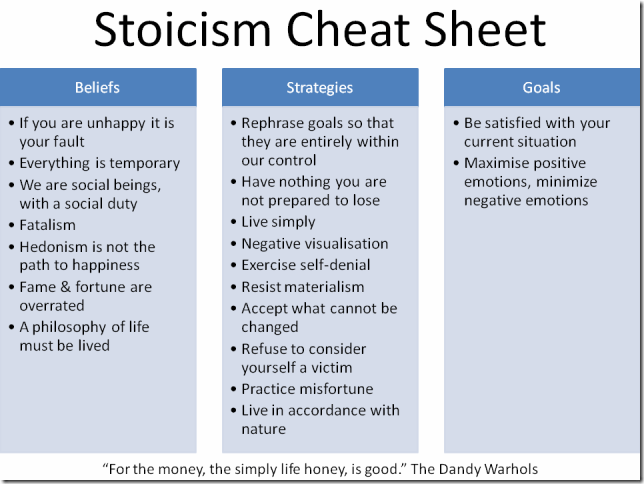
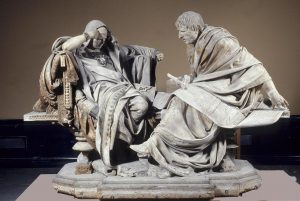
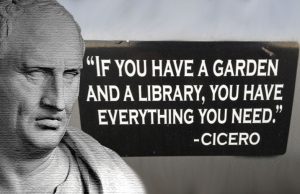
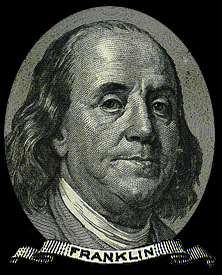 FEE
FEE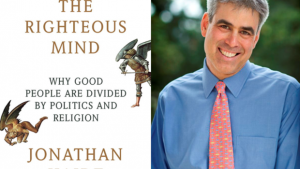 Jonathan Haidt is looking closely at society and how things evolve.
Jonathan Haidt is looking closely at society and how things evolve.  The power of money and ideas – This interview explains Charles Koch’s move from business to the business of funding of ideas. Listen to his move from scholarships to professors to think tanks to state and national politics. This story is about the power of ideas to change the world. Q: “Why do you care so personally about shaping the history of mankind?” About 24:00 in, Koch explains his motivations.
The power of money and ideas – This interview explains Charles Koch’s move from business to the business of funding of ideas. Listen to his move from scholarships to professors to think tanks to state and national politics. This story is about the power of ideas to change the world. Q: “Why do you care so personally about shaping the history of mankind?” About 24:00 in, Koch explains his motivations.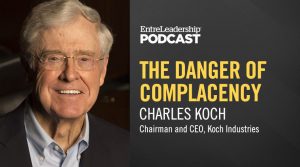 Charles Koch argues that the biggest threats to America these days are special interests, cronyism, and corporate welfare. Which may seem strange if you think of a corporate CEO, like Koch, as a beneficiary of those things. He also argues that our political system has turned into a dumpster fire, with both parties guilty of
Charles Koch argues that the biggest threats to America these days are special interests, cronyism, and corporate welfare. Which may seem strange if you think of a corporate CEO, like Koch, as a beneficiary of those things. He also argues that our political system has turned into a dumpster fire, with both parties guilty of 
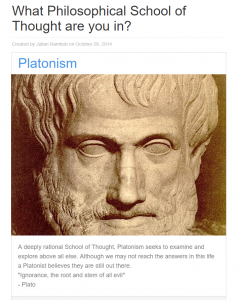
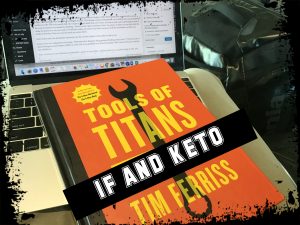 1. There are two parts to self-improvement
1. There are two parts to self-improvement
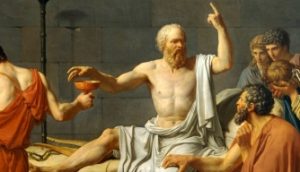 Aristotle on Why Things Are;
Aristotle on Why Things Are;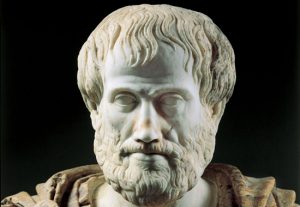
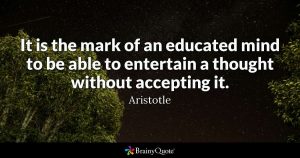 In conclusion, let me return to the two initial citations that are found at the beginning of these reflections. The first concerns the mind that is found in each member our kind. It is because we have minds that we can worry about, wonder about, what is out there, what is not ourselves. And we can not only pay attention to it, but we can see its diversity and its unities. But we know with our mind not only what is not ourselves, but also the possibility that we can change, reshape many things. We even suspect that we can and should use things that are just there through no contribution of our own. Indeed, it suggests that the uninhabited world was in fact meant to be inhabited. It was meant to provide a place for a being that knew and acted. In so doing, it revealed his soul.
In conclusion, let me return to the two initial citations that are found at the beginning of these reflections. The first concerns the mind that is found in each member our kind. It is because we have minds that we can worry about, wonder about, what is out there, what is not ourselves. And we can not only pay attention to it, but we can see its diversity and its unities. But we know with our mind not only what is not ourselves, but also the possibility that we can change, reshape many things. We even suspect that we can and should use things that are just there through no contribution of our own. Indeed, it suggests that the uninhabited world was in fact meant to be inhabited. It was meant to provide a place for a being that knew and acted. In so doing, it revealed his soul. Fisker patents radical ‘solid state battery’ it claims can power a car for 500 miles and recharge in a MINUTE
Fisker patents radical ‘solid state battery’ it claims can power a car for 500 miles and recharge in a MINUTE What are the likely contenders for the power source of the future? Here are our picks for the top lithium-ion alternatives.
What are the likely contenders for the power source of the future? Here are our picks for the top lithium-ion alternatives.
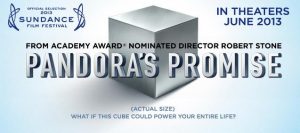 Speaking of alternative energy – still a big fan of nuclear – check out
Speaking of alternative energy – still a big fan of nuclear – check out  Much safer – No risk of environmental radiation contamination or plant explosion (e.g., Chernobyl, Fukushima, Three Mile Island)
Much safer – No risk of environmental radiation contamination or plant explosion (e.g., Chernobyl, Fukushima, Three Mile Island)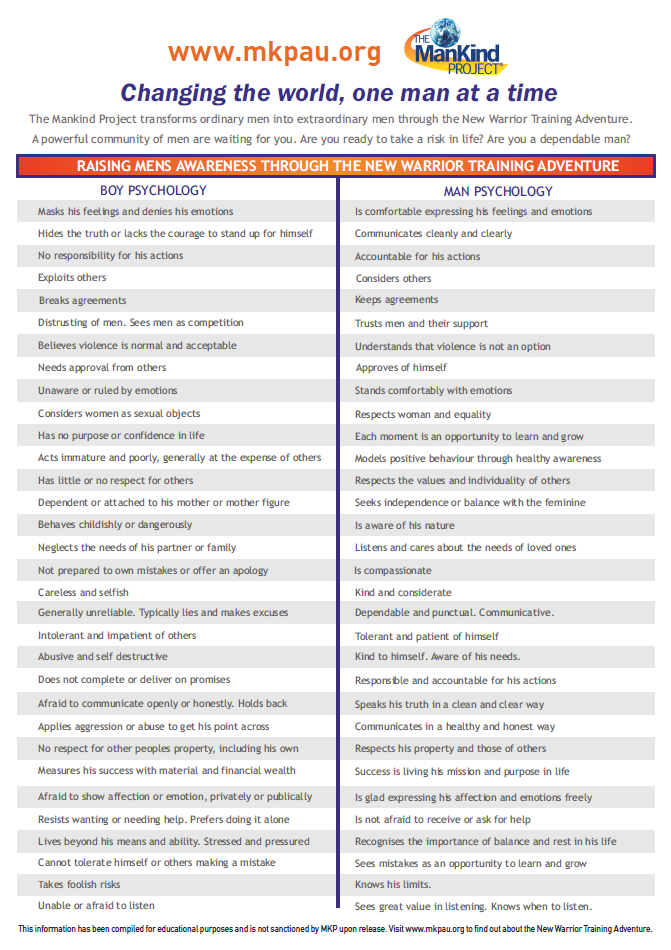 Throughout ancient times there are numerous rights of passage from childhood to manhood. These journeys are ceremonial and a part of society evolving leaders. In our day and age, I find broken men that have spent the energy to learn about their motivations fascinating. The men that I respect and am drawn to have gotten in touch with their shadows through, faith (typically born again more so than Catholic), addiction recovery, career military and in particular Marines, divorces where a man loses everything, business loss or any other event that forced the man to shake their beliefs to their very core. Through my work in Mankind Project I did the hard work, continue to dig into who I am and I’ve learned that many men are struggling to know who they are. Becoming aware of your ‘shadow’ or that part of you that is deeply buried and shows up to sabotage what is good, true and beautiful is the first step, understanding how the shadow part of our nature shows up in our lives is an ever happening journey. I’ve invited 8 men to the
Throughout ancient times there are numerous rights of passage from childhood to manhood. These journeys are ceremonial and a part of society evolving leaders. In our day and age, I find broken men that have spent the energy to learn about their motivations fascinating. The men that I respect and am drawn to have gotten in touch with their shadows through, faith (typically born again more so than Catholic), addiction recovery, career military and in particular Marines, divorces where a man loses everything, business loss or any other event that forced the man to shake their beliefs to their very core. Through my work in Mankind Project I did the hard work, continue to dig into who I am and I’ve learned that many men are struggling to know who they are. Becoming aware of your ‘shadow’ or that part of you that is deeply buried and shows up to sabotage what is good, true and beautiful is the first step, understanding how the shadow part of our nature shows up in our lives is an ever happening journey. I’ve invited 8 men to the  Blessed is how I look back on my childhood. I was born in a small town in Wisconsin at a time when the center of America was the small town and the idyllic life depicted in Norman Rockwell’s portraits of America was my backyard. Our town had a couple stop lights and is made up of multi-generation German, Norwegian or Irish families. The wealthiest family owned the John Deere dealership and everyone knew each neighbor and their kids and their grandparents. One of the chapters in my book on the Decline of America relates to the ramifications surrounding the decline in farming and the rural community and the flight into the cities. The shift clearly had economic impacts but more importantly, the disruption of families and small-town communities left America worse off.
Blessed is how I look back on my childhood. I was born in a small town in Wisconsin at a time when the center of America was the small town and the idyllic life depicted in Norman Rockwell’s portraits of America was my backyard. Our town had a couple stop lights and is made up of multi-generation German, Norwegian or Irish families. The wealthiest family owned the John Deere dealership and everyone knew each neighbor and their kids and their grandparents. One of the chapters in my book on the Decline of America relates to the ramifications surrounding the decline in farming and the rural community and the flight into the cities. The shift clearly had economic impacts but more importantly, the disruption of families and small-town communities left America worse off.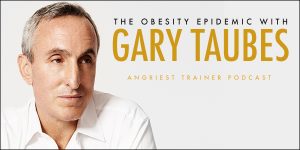
 I’m starting compiling notes on the philosophies I subscribe to as a business leader. Over my career, I’ve worked with hundreds of staff members and continue to learn each day on how to better lead my organizations. Following is an outline of what could someday be a book on business leadership:
I’m starting compiling notes on the philosophies I subscribe to as a business leader. Over my career, I’ve worked with hundreds of staff members and continue to learn each day on how to better lead my organizations. Following is an outline of what could someday be a book on business leadership: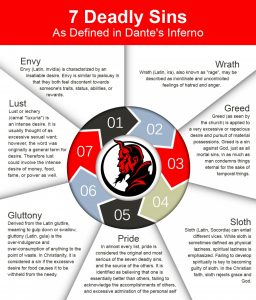 It’s important to know that these negative virtues are part of the human condition. Throughout history, people, societies, and countries have become out of balance with the deadly sins to their detriment.
It’s important to know that these negative virtues are part of the human condition. Throughout history, people, societies, and countries have become out of balance with the deadly sins to their detriment. I’ve been an entrepreneur for over 30 years. There a number of analogies I use to explain what it’s like to do what I do. Skydiving without a parachute is sometimes what it feels like or Cortes in 1519 that landed in Veracruz and burned the ships to ensure total commitment to his adventure.
I’ve been an entrepreneur for over 30 years. There a number of analogies I use to explain what it’s like to do what I do. Skydiving without a parachute is sometimes what it feels like or Cortes in 1519 that landed in Veracruz and burned the ships to ensure total commitment to his adventure.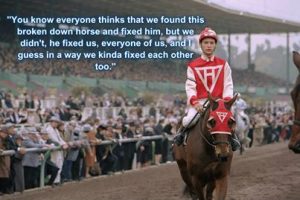
 (This article refers to investing in gold mining but the ideas apply on …
(This article refers to investing in gold mining but the ideas apply on …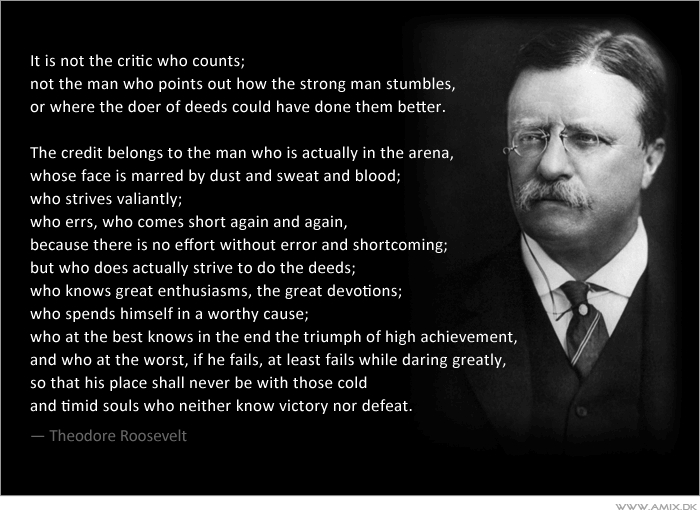
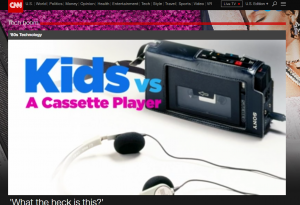 I grew up in the 1980’s. Grandson of a Butcher, the son of a Butcher, a transplant to Arizona via Wisconsin. Our entire family and community where JFK Democrats. From an early age, I identified with the Republican philosophies and with a huge streak to chart my own course as an entrepreneur. I grew up on Reagan and American exceptionalism. Check out the CNN 80’s series to get a sense of the time that formed who I am.
I grew up in the 1980’s. Grandson of a Butcher, the son of a Butcher, a transplant to Arizona via Wisconsin. Our entire family and community where JFK Democrats. From an early age, I identified with the Republican philosophies and with a huge streak to chart my own course as an entrepreneur. I grew up on Reagan and American exceptionalism. Check out the CNN 80’s series to get a sense of the time that formed who I am.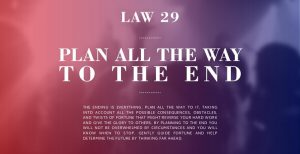 I read Robert Greene’s book, 48 Laws of Power and got a lot out of it. After listening to his life story, I want to dig into his new Mastery. I’ve referenced Malcolm Gladwell and his books about what separates common from great, it sounds like Mastery will be right up my. ally! This is a great interview that explains, once again, my theory that without understanding your own emotional motivations you will be short lived as a leader. Give it a listen.
I read Robert Greene’s book, 48 Laws of Power and got a lot out of it. After listening to his life story, I want to dig into his new Mastery. I’ve referenced Malcolm Gladwell and his books about what separates common from great, it sounds like Mastery will be right up my. ally! This is a great interview that explains, once again, my theory that without understanding your own emotional motivations you will be short lived as a leader. Give it a listen. Stephen L. Gomes, Ph.D.
Stephen L. Gomes, Ph.D.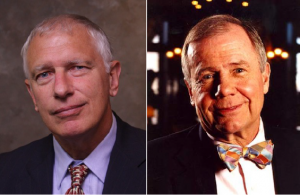 If you haven’t stumbled across Doug Casey, I highly recommend that you dig in. Casey owns Casey Research and wrote a book called International Man back in the 70’s. His theory was that as an entrepreneur we need to find markets. Sometimes, those markets aren’t in your country, aren’t very well known and aren’t where the heard is. He is able to use history and politics to predict future markets and he is extremely matter of fact about his analysis. Read his book,
If you haven’t stumbled across Doug Casey, I highly recommend that you dig in. Casey owns Casey Research and wrote a book called International Man back in the 70’s. His theory was that as an entrepreneur we need to find markets. Sometimes, those markets aren’t in your country, aren’t very well known and aren’t where the heard is. He is able to use history and politics to predict future markets and he is extremely matter of fact about his analysis. Read his book, 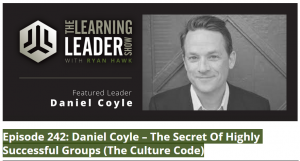
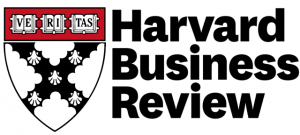 HERE’s
HERE’s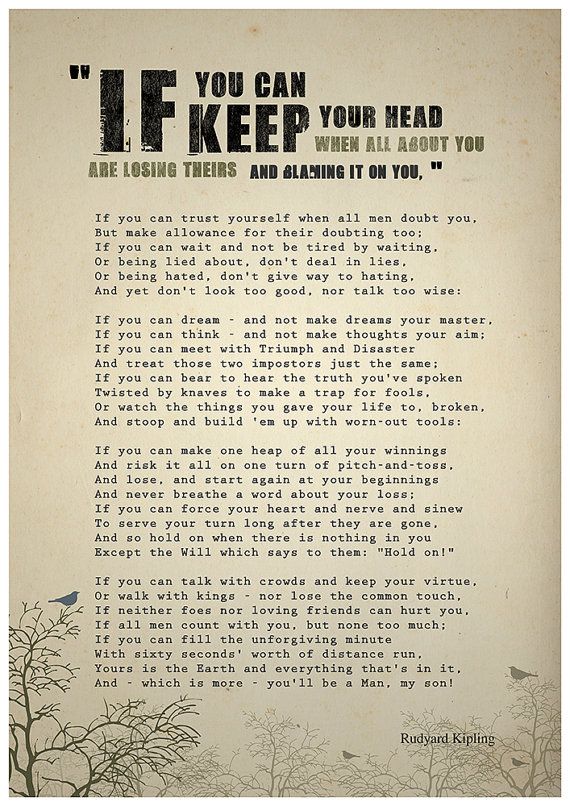
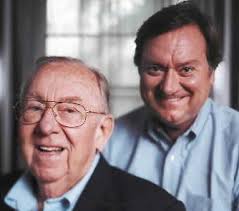 An amazing archive interview from Diane Rheem with Tim Russert. This book and Tim’s explanation of his Dad is powerful. Big Russ grew up in the Depression and is from the silent generation. Here’s Tim explaining his Dad, Big Russ. So for my Dad, my Granddads and to hopefully be the Dad in that models the Big Russ life.
An amazing archive interview from Diane Rheem with Tim Russert. This book and Tim’s explanation of his Dad is powerful. Big Russ grew up in the Depression and is from the silent generation. Here’s Tim explaining his Dad, Big Russ. So for my Dad, my Granddads and to hopefully be the Dad in that models the Big Russ life. Want to know how bad the problem really is? You can point to
Want to know how bad the problem really is? You can point to  Spent the weekend up in Phoenix and all over the radio, on billboards and in print magazines I saw ads for the UofA MBA program……why? Hint, it’s where people can afford and can benefit from a Masters in Business.
Spent the weekend up in Phoenix and all over the radio, on billboards and in print magazines I saw ads for the UofA MBA program……why? Hint, it’s where people can afford and can benefit from a Masters in Business.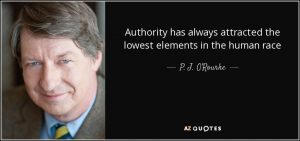 This episode of EconTalk is being recorded in front of a live audience in Washington, D.C. in honor of the 40th Anniversary of the Cato Institute. Our topic is the past, present, and future of liberty. And to talk about it we have three special guests, David Boaz…, P. J. O’Rourke…, and George Will…. So, I want to start with the state of liberty in America. Is the glass half full or half empty? David, why don’t you lead us off?
This episode of EconTalk is being recorded in front of a live audience in Washington, D.C. in honor of the 40th Anniversary of the Cato Institute. Our topic is the past, present, and future of liberty. And to talk about it we have three special guests, David Boaz…, P. J. O’Rourke…, and George Will…. So, I want to start with the state of liberty in America. Is the glass half full or half empty? David, why don’t you lead us off?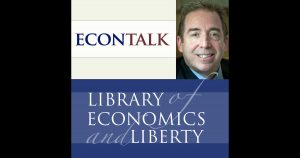 Another podcast I enjoy is EconoTalk with Russ Roberts. He and Tyler Cowen (to some degree Malcolm Gladwell and the team at Freakonomics) help take complex subjects, package them in palatable terms and deliver them to us listeners. This week, Russ interviewed
Another podcast I enjoy is EconoTalk with Russ Roberts. He and Tyler Cowen (to some degree Malcolm Gladwell and the team at Freakonomics) help take complex subjects, package them in palatable terms and deliver them to us listeners. This week, Russ interviewed 
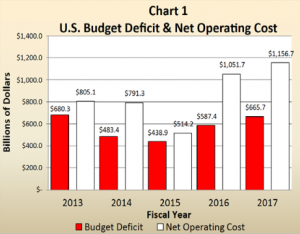
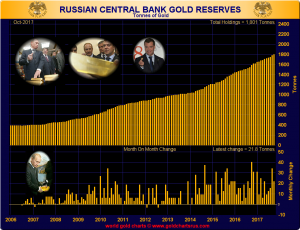 What I expect to happen before then, is a lot of war speaking/threats/trade wars – high trariff or scrap previously made trade agreements around China/Russia area and political/small-scale wars around countries that are within China/Russia’s orbit, and countries with a lot of resources (oil, and minerals — North Korea and Afghanistan have trillions of UNMINED mineral as well, look it up). This is done to provoke war, world war. Many of grand-scale wars in the past took place at this junction, as it is the last move in the playbook to hold on to the influence by an impire. However, we now have an alternative. No war is needed. Life adjustment will be at the minimal worldwide.
What I expect to happen before then, is a lot of war speaking/threats/trade wars – high trariff or scrap previously made trade agreements around China/Russia area and political/small-scale wars around countries that are within China/Russia’s orbit, and countries with a lot of resources (oil, and minerals — North Korea and Afghanistan have trillions of UNMINED mineral as well, look it up). This is done to provoke war, world war. Many of grand-scale wars in the past took place at this junction, as it is the last move in the playbook to hold on to the influence by an impire. However, we now have an alternative. No war is needed. Life adjustment will be at the minimal worldwide. 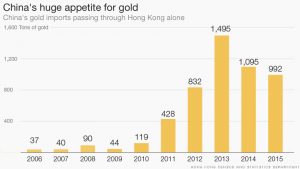 Every countries can come out a winner but most, people around the world can all prosper together. Countries with a lot of debts will still grow but counries with less debts will have more room to grow faster. But that commerce (technology and knowledge) will flow from first world nations (heavy debts) to less developed nations (usually very low debt per capita). Hanomy Manifesto, free download at
Every countries can come out a winner but most, people around the world can all prosper together. Countries with a lot of debts will still grow but counries with less debts will have more room to grow faster. But that commerce (technology and knowledge) will flow from first world nations (heavy debts) to less developed nations (usually very low debt per capita). Hanomy Manifesto, free download at 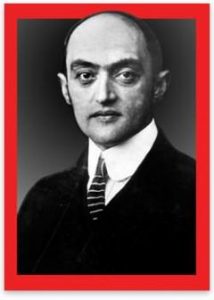 Wiki
Wiki The Trees – Getty Lee
The Trees – Getty Lee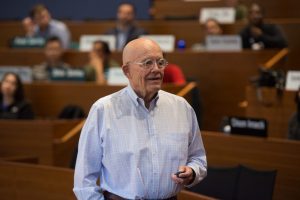 PLSC 270: Capitalism:
PLSC 270: Capitalism: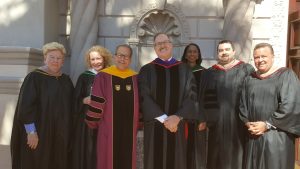 You might be saying: “That is what I was preparing for these last 4 years? Are you kidding me? I was focused on getting into a good college. I was focused on making the team.” True. You were. Those are important as well. But behind that we were focused on getting you prepared to go out into the world and to make a genuine difference. Not to take your place in that world. But to create your place in our world using your God given talents.
You might be saying: “That is what I was preparing for these last 4 years? Are you kidding me? I was focused on getting into a good college. I was focused on making the team.” True. You were. Those are important as well. But behind that we were focused on getting you prepared to go out into the world and to make a genuine difference. Not to take your place in that world. But to create your place in our world using your God given talents. In 2016, Professor Barr helped found the
In 2016, Professor Barr helped found the 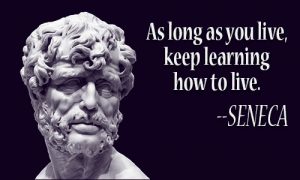 ‘other vices affect our judgment, anger affects our sanity: others come in mild attacks and grow unnoticed, but men’s minds plunge abruptly into anger. … Its intensity is in no way regulated by its origin: for it rises to the greatest heights from the most trivial beginnings.’
‘other vices affect our judgment, anger affects our sanity: others come in mild attacks and grow unnoticed, but men’s minds plunge abruptly into anger. … Its intensity is in no way regulated by its origin: for it rises to the greatest heights from the most trivial beginnings.’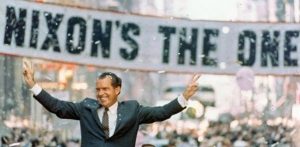 There was no doubt, said Johnson, that Nixon’s campaign team was trying to scupper peace talks aimed at ending the Vietnam War. They were afraid that peace in Vietnam would help Nixon’s Democratic rival, Hubert Humphrey, to clinch the election.
There was no doubt, said Johnson, that Nixon’s campaign team was trying to scupper peace talks aimed at ending the Vietnam War. They were afraid that peace in Vietnam would help Nixon’s Democratic rival, Hubert Humphrey, to clinch the election.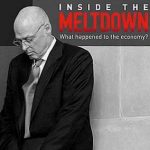 One of my favorite series to learn from is the PBS Frontline. Here’s a great one on the
One of my favorite series to learn from is the PBS Frontline. Here’s a great one on the 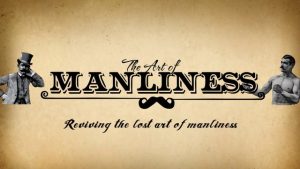 AoM is a blog about growing up well, aimed at men and their unique challenges and interests. We explore all things manly — from the serious and philosophical to the practical and fun. We seek to uncover how to live with grandpa’s swagger, virtue, and know-how in the present age by wedding the best of the past to the best of the present. The end goal is to create a synergy of tradition and modernity that offers men a way forward and signposts on how to live an excellent, flourishing life.
AoM is a blog about growing up well, aimed at men and their unique challenges and interests. We explore all things manly — from the serious and philosophical to the practical and fun. We seek to uncover how to live with grandpa’s swagger, virtue, and know-how in the present age by wedding the best of the past to the best of the present. The end goal is to create a synergy of tradition and modernity that offers men a way forward and signposts on how to live an excellent, flourishing life. Freakonomics Radio
Freakonomics Radio HERE
HERE Seven years on the air, covering the play by play of American politics I consider myself more up on current events than most. I predicted a Romney win in 2012 and predicted a Trump loss in 2016. So much for a career as a political prognosticator. Here’s the most important reason for a Trump presidency…
Seven years on the air, covering the play by play of American politics I consider myself more up on current events than most. I predicted a Romney win in 2012 and predicted a Trump loss in 2016. So much for a career as a political prognosticator. Here’s the most important reason for a Trump presidency…